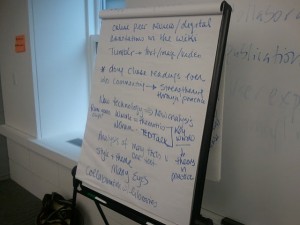One of the most interesting discussions at ThatCamp Philly was the one on lowering barriers to sharing digital humanities content. This was a very wide ranging discussion as seen by my notes below.
- Lot of discussion of internal conflicts over being "open"
- Some discussion of accessibility issues with flash.
- Different populations use different devices. If you have high school students with smart phones, you need your stuff to work for them.
- I chose PBWorks for my class wikis because of how nice the look on phones/tablets.
- Tenure committees are more impressed by new stuff than continuing work on old stuff.
- Have to get over fear of sharing.
